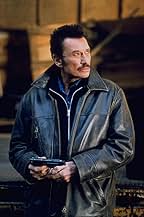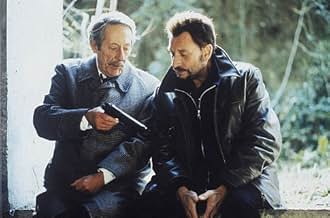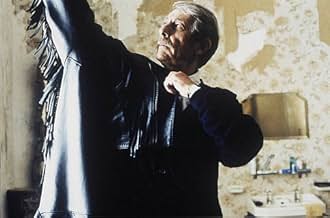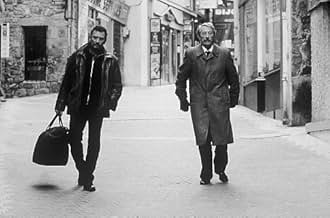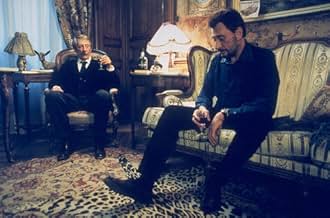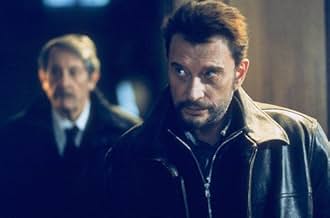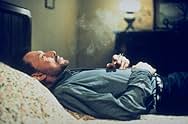IMDb-BEWERTUNG
7,1/10
7712
IHRE BEWERTUNG
Ein Bankräuber kommt in einer französischen Kleinstadt an, um einen Job zu erledigen, und schließt eine Freundschaft mit einem pensionierten Poesielehrer.Ein Bankräuber kommt in einer französischen Kleinstadt an, um einen Job zu erledigen, und schließt eine Freundschaft mit einem pensionierten Poesielehrer.Ein Bankräuber kommt in einer französischen Kleinstadt an, um einen Job zu erledigen, und schließt eine Freundschaft mit einem pensionierten Poesielehrer.
- Regie
- Drehbuch
- Hauptbesetzung
- Auszeichnungen
- 8 Gewinne & 10 Nominierungen insgesamt
Empfohlene Bewertungen
As we left the theatre someone inevitably said, `that was very French.' And so it was, or at least it was a movie that Hollywood would never have made. Washed-up bank robber meets retired French teacher and they become friends, each hankering after the other's lifestyle. The teacher is facing open-heart surgery, the robber the prospect of a dangerous bank job with three unreliable associates. All this set in a really boring small town in the Rhone Valley (filmed mainly in Annonoy with funding of course from the local Film Commission).
Yet it works. Watching the two principals, Jean Rochefort as the teacher and Johnny Hallyday as the robber is like watching Torvill and Dean perfect synchronisation, but with humour added. There's not a false move and the script is seamless it seems quite inevitable that such an improbable relationship could develop. Somehow we don't notice the improbabilities, such as the gang stealing a huge (by French standards) and rare BMW 740 for use as a getaway car the evening before the robbery from a car park in the centre of town, and making no effort to conceal it until the robbery at 10 heurs the next day.
Perhaps the relationship can be explained on the basis that Jean likes to talk and Johnny is content to listen. As they get to know each other Jean becomes quite concerned about his guest and Johnny, for his part, comes to admire his host. He even upbraids Jean's quite pleasant mistress for boring Jean with talk of her children's misdemeanours.
The film ends in a flurry of `maybe things might have been different if '. You can choose the alternative ending you like in fact, though the fantasy is more palatable that reality. Unlike Hollywood, French filmmakers trust their audience, and it is unlikely too many viewers will feel cheated here.
Yet it works. Watching the two principals, Jean Rochefort as the teacher and Johnny Hallyday as the robber is like watching Torvill and Dean perfect synchronisation, but with humour added. There's not a false move and the script is seamless it seems quite inevitable that such an improbable relationship could develop. Somehow we don't notice the improbabilities, such as the gang stealing a huge (by French standards) and rare BMW 740 for use as a getaway car the evening before the robbery from a car park in the centre of town, and making no effort to conceal it until the robbery at 10 heurs the next day.
Perhaps the relationship can be explained on the basis that Jean likes to talk and Johnny is content to listen. As they get to know each other Jean becomes quite concerned about his guest and Johnny, for his part, comes to admire his host. He even upbraids Jean's quite pleasant mistress for boring Jean with talk of her children's misdemeanours.
The film ends in a flurry of `maybe things might have been different if '. You can choose the alternative ending you like in fact, though the fantasy is more palatable that reality. Unlike Hollywood, French filmmakers trust their audience, and it is unlikely too many viewers will feel cheated here.
The great Jean Rochefort plays a mild-mannered old man who's so lonely that as soon as mopey bank robber Johnny Hallyday lets a room in his empty mansion, he simply won't stop talking to him, no matter how little Hallyday says back! Both men are bored with their current lives but are intrigued by the other's.
This slow burner may not be interesting enough for many, certainly not quick enough for most. But its nevertheless a fascinating "little" film and character study. It works in the play between these two men from different worlds, who grow to aspire to see what its like to be the other person. There's no giant twist, no supernatural catch at the end, so don't be expecting it - just enjoy it for the wry, vivid look into the rapport between these two men with nothing in common.
3.5/5. A treat.
This slow burner may not be interesting enough for many, certainly not quick enough for most. But its nevertheless a fascinating "little" film and character study. It works in the play between these two men from different worlds, who grow to aspire to see what its like to be the other person. There's no giant twist, no supernatural catch at the end, so don't be expecting it - just enjoy it for the wry, vivid look into the rapport between these two men with nothing in common.
3.5/5. A treat.
'The Man on the Train' is a beautiful movie about two man later in life. One of them is a bank robber, the other is a teacher. They meet by accident and become friends. Slowly they both start wishing they would have been the other man.
The teacher (Jean Rochefort) knows what the bank robber (Johnny Hallyday) does for his money. He even offers to help, but the day the bank will be robbed he has to go into surgery. We see how the teacher pretends to be a cool guy, even changes his looks to that. We also see how the bank robber pretends to be a teacher when the real teacher is out.
All this leads to an ending that closes things in one way, but leaves things open in another. We feel an ending like this coming, but it still works. It is beautiful and fits the rest of the movie perfectly.
If your favorite movies are like 'The Fast and the Furious' you will probably not like this. It is a real European movie, sometimes slow, most of the time very quiet, but if you can appreciate this kind of film making you will like 'The Man on the Train'.
The teacher (Jean Rochefort) knows what the bank robber (Johnny Hallyday) does for his money. He even offers to help, but the day the bank will be robbed he has to go into surgery. We see how the teacher pretends to be a cool guy, even changes his looks to that. We also see how the bank robber pretends to be a teacher when the real teacher is out.
All this leads to an ending that closes things in one way, but leaves things open in another. We feel an ending like this coming, but it still works. It is beautiful and fits the rest of the movie perfectly.
If your favorite movies are like 'The Fast and the Furious' you will probably not like this. It is a real European movie, sometimes slow, most of the time very quiet, but if you can appreciate this kind of film making you will like 'The Man on the Train'.
This is a beautifully acted and written story of two older men dealing with regret. The dialogue is witty, but never self-conscious and the performances are great. Johnny Hallyday (The Elvis of France!) is especially surprising in his role as the bank robber at the end of his career.
The story is well paced, and unlike a lot of French movies, it's not just a bunch of talking heads, but a real story with compelling characters. The two strangers meet by hazard and forge a close relationship, each trading bits and pieces of their lives. The scene where Jean Roquefort gives Johnny his slippers is a literal manifestation of their efforts to change their lives, albeit late in life.
A lovely little film from beginning to end!
The story is well paced, and unlike a lot of French movies, it's not just a bunch of talking heads, but a real story with compelling characters. The two strangers meet by hazard and forge a close relationship, each trading bits and pieces of their lives. The scene where Jean Roquefort gives Johnny his slippers is a literal manifestation of their efforts to change their lives, albeit late in life.
A lovely little film from beginning to end!
"Man on the train", directed by Patrice Leconte is "intimiste" French cinema at its best. It tells the story of a chance encounter and ensuing friendship between Milan, a gangster who is coming to a small French town to rob a bank and Manesquier, a retired professor of poetry who has lived there his whole life. The two protagonists could not be more different and yet, each one becomes fascinated by the other's life. Soon, Milan tries on slippers and Manesquier is shooting a gun at soda cans. Was Milan's life wasted because he never had the strength to fill his life with the structure he so desires? Was Manesquier's life wasted because he never had the strength to escape the structured life he so loathes? Will they go all the way and actually exchange lives? The movie is extremely well directed and photographed, with grainy blueish colors that support each character's melancholy. The script is tight and leaves room for silent moments which are as important to the story as the dialogue (a concept unknown in Hollywood). Every word has a deeper meaning than its litteral one. In one of the best scenes of the movie, the elegant poetry professor Manesquier puts on Milan's leather jacket and stands in front of the mirror saying in English: "The name is Earp...Wyatt Earp". But in the end, what makes the movie such a gem is the talent of the two lead actors who, like their characters, are such extreme opposites that their screen relationship could easily have ended up devoid of any chemestry. Jean Rochefort is an intellectual and one of France's greatest and most subtle living actors. Johnny Hallyday is the uneducated, over-the-top rock'n roll singer and social icon who has monopolized the #1 spot in French music charts since 1960 and who has been derided by the French intelligentsia ever since. Until the movie, Rochefort himself was no fan of Hallyday, though he likes to say with a grin: "Madame Rochefort, on the other hand...". They have since become friends. It, reportedly, took a lot of effort by Rochefort and Leconte to make Hallyday comfortable enough to act opposite Rochefort whom he saw as a towering icon. They most certainly succeeded since, in the end, it is the surprising subtelty of Hallyday's performance that makes the movie so poignant. Despite the botox injections and the face lifts, his Mount Rushmore face looks like that of a man who has been to hell and back a few hundred times. He has such presence and charisma that you can't take your eyes off him whenever he appears on the screen. Though he plays Milan with a minimalist approach, both in demeanor and delivery, he manages to display the most intense emotions in a simple grin, a gesture or a stare. The way he smokes Manesquier's pipe while explaining Balzac's "Eugenie Grandet" (which he has obviously never read) to a private student of Manesquier will make you chuckle. The way he looks at Manesquier when he leaves his house at the end of the movie will simply break your heart... "Man on the train" is a gentle, tender film which asks big questions in little ways. Let's pray it never gets remade in Hollywood...
Wusstest du schon
- WissenswertesJean Rochefort died in October 2017. Two months later, Johnny Hallyday died.
- VerbindungenReferenced in 69 minutes sans chichis: Johnny Hallyday (2015)
- SoundtracksImpromptu in A-flat Major, Op. 142 No. 2 (D. 935)
Written by Franz Schubert
Top-Auswahl
Melde dich zum Bewerten an und greife auf die Watchlist für personalisierte Empfehlungen zu.
- How long is Man on the Train?Powered by Alexa
Details
- Erscheinungsdatum
- Herkunftsländer
- Offizieller Standort
- Sprache
- Auch bekannt als
- Man on the Train
- Drehorte
- Produktionsfirmen
- Weitere beteiligte Unternehmen bei IMDbPro anzeigen
Box Office
- Bruttoertrag in den USA und Kanada
- 2.542.020 $
- Eröffnungswochenende in den USA und in Kanada
- 41.138 $
- 11. Mai 2003
- Weltweiter Bruttoertrag
- 7.727.906 $
- Laufzeit1 Stunde 30 Minuten
- Farbe
- Sound-Mix
- Seitenverhältnis
- 2.35 : 1
Zu dieser Seite beitragen
Bearbeitung vorschlagen oder fehlenden Inhalt hinzufügen

Oberste Lücke
By what name was Das zweite Leben des Monsieur Manesquier (2002) officially released in India in English?
Antwort

